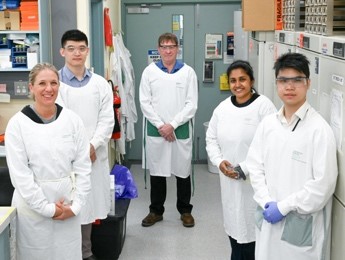Dr Gang Liu, recipient of the inaugural CREATE Hope Scientific Fellowship in Pulmonary Fibrosis (PF) sat down with the PACT team to discuss his project “Extracellular proteins regulate inflammation and fibrosis in pulmonary fibrosis”.

Tell us a bit about yourself and why you chose PF as your research area:
I am the leader of the fibrosis node in the Centre for Inflammation at University of Technology (UTS) and Centenary Institute. I am also a lecturer, teaching the immunology of respiratory diseases at UTS. Previously, I obtained my PhD, then worked for four years as a postdoc research fellow in fibrosis and respiratory diseases at the Hunter Medical Research Institute and University of Newcastle.
I have been passionate about research into Pulmonary Fibrosis since my PhD. PF is a severe disease which affects about 1 in 10,000 Australians, however current therapies have limited efficacy and do not reverse or halt the disease. My research aims to further understand the mechanisms of Pulmonary Fibrosis and develop new therapeutic options for this severe disease to ultimately save lives.
Describe your clinical research project in a couple of sentences:
Extracellular matrix (ECM) proteins are a group of molecules, such as collagen, which support lung tissue structure. Abnormal deposition of ECM leads to irreversible structural changes in lungs that then develop Pulmonary Fibrosis. My research targets ECM proteins, aiming to reduce inflammation and fibrosis in Pulmonary Fibrosis patients.
Tell us how this project came about:
ECM proteins in Idiopathic Pulmonary Fibrosis (IPF) were a major focus of my PhD study in Prof Phil Hansbro’s lab, from 2011. In my research I was trying to explore how ECM proteins control structural changes in the lung, however we accidently, and excitingly, made the novel finding that these molecules also regulate inflammation in lung diseases. In further work supported by Lung Foundation Australia I have found more evidence that ECM proteins control both inflammation and fibrosis in IPF. In my current project I a seeking further understanding of the role of ECM proteins in Pulmonary Fibrosis.
What do you hope this project will achieve?
I hope we will find that ECM proteins act on specific types of inflammatory cells and regulate their movement and behaviour in Pulmonary Fibrosis. Therapeutic targeting of ECM proteins will ultimately lead to a new treatment option for Pulmonary Fibrosis.
What has been the biggest challenge of the project so far?
Animal research models are one of the important tools for the study of Pulmonary Fibrosis. We have established several models that develop all the features of lung fibrosis, however the biggest challenge is to find the best model which represents irreversible tissue remodelling in Pulmonary Fibrosis. Also, it has been difficult to obtain patient samples during COVID-19. The biobank of the Australian Idiopathic Pulmonary Fibrosis Registry will support us for this project and hopefully this will overcome this challenge.
The people working on this project are:
As the leader of fibrosis node at Centre for Inflammation at UTS/Centenary Institute, I will be the lead researcher on this project. Dr Ashleigh Philp will be the key group member for this project. I also have ongoing support from Prof Phil Hansbro, Prof Janette Burgess and A/Prof Tamera Corte.
What do you see as the biggest evidence gaps in PF care? What are the clinical research priorities?
There are many unknowns in Pulmonary Fibrosis, and the biggest difficulty is to understand why and how people get this disease. Thus, it is important to understand the mechanism of ECM proteins in Pulmonary Fibrosis. This will help us to identify new therapeutic targets for this disease and to guide clinical practice in treating and managing PF.
What will the support of the CREATE Hope Scientific Fellowship mean for your research?
I am grateful to receive the CREATE Hope Scientific fellowship, which will allow me to fully focus my career on Pulmonary Fibrosis research. It will also help me to expand my project to new perspectives in Pulmonary Fibrosis and this will help me to obtain further competitive national and international research funding, from funding bodies such as NHMRC, Australian Research Council and National Institute of Health.
